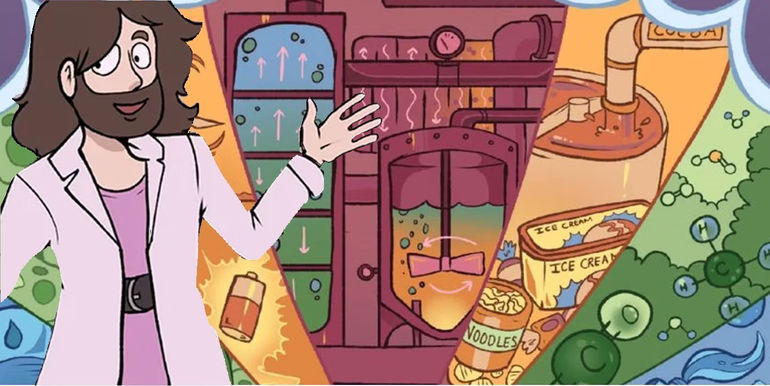The National Science Foundation is exploring the potential of using comics to enhance STEM learning for students. To investigate this, they have awarded a grant to Lucas "Luke" Landherr, a Distinguished Teaching Professor at Northeastern University’s College of Engineering.
Dr. Landherr has been incorporating comics in their work for several years. Notably, the peer-reviewed journal Chemical Engineering Education features the ongoing comic strip "Drawn to Engineering," illustrated by one of Dr. Landherr's former students, Monica Keszler (currently pursuing a PhD in Germany). Additionally, Dr. Landherr has created the K-12 outreach comic, "The Wide World of Chemical Engineering." Now, the effectiveness of Dr. Landherr's use of comics will be evaluated through a larger-scale program.
How will the comics program work?
Dr. Landherr plans to develop a collection of comics to supplement a foundational chemical engineering course offered at Northeastern University and five other collaborating institutions. These comics will be integrated into the curriculum, and a study will be conducted to assess whether their use leads to improved grades compared to classes that do not incorporate the comics.
Dr. Landherr expressed his enthusiasm for conducting a comprehensive analysis on a larger scale. While creating comics is enjoyable, he emphasized the lack of interest in delving into the potential and best approaches of STEM comics. He highlighted the existence of numerous untapped STEM comics, leaving unanswered questions. Dr. Landherr acknowledged the enjoyment in creating comics but also recognized the potential for long-term impact.
Despite the use of comics in teaching young children, their utilization in university education is rare. Dr. Landherr aims to reverse this trend by conducting the first substantial study of its kind in STEM, particularly at the undergraduate level. He finds it surprising that graphic novels are highly prevalent in children's publishing, yet once these children reach college, the resources they had for learning or leisure are no longer utilized.
What have past students of Landherr's said about the use of comics in their study?
Keszler, who was formerly taught by Dr. Landherr, explains her belief in the study's merit, stating, "Whenever I peruse a textbook, I instinctively gravitate towards the accompanying visuals. These visual aids offer a lifeline amidst the overwhelming barrage of new ideas, as they provide something tangible to hold onto. Introducing comics into the learning process greatly enhances memorability. Think about it—we initially learn fundamental concepts through songs, such as the alphabet. This study employs a strikingly similar concept."
Helen Koukoulas, a recent graduate with a bachelor's and master's degrees in chemical engineering, expressed the effectiveness of the comics for her, stating, "Engineering is a highly technical and science-oriented field, but it also demands a significant amount of creativity that I found lacking in other courses. At the core of engineering lies problem-solving, making us the problem-solvers for companies. Tackling those challenges that other departments cannot handle requires not only creativity but also a strong grasp of engineering principles. When you enter the industry, the work becomes more hands-on and visual. Being exposed to this perspective in Professor Landherr's classes truly ignited the creative spark in my mind, which then influenced my approach to various tasks."
You can find most of the comics produced by Dr. Landherr (and their students) on this website.
Source: Northeastern University
Editor's P/S
As a hard fan of comics, I am thrilled to learn about the National Science Foundation's study on the effectiveness of using comics in STEM education. This study, led by Dr. Lucas "Luke" Landherr, a Distinguished Teaching Professor at Northeastern University's College of Engineering, aims to explore how comics can enhance learning and gather feedback from previous students who have experienced this approach.
I believe that comics have the potential to be a powerful tool in STEM education. They can engage students in a way that traditional textbooks and lectures cannot. Comics can also help students to visualize complex concepts and make them more memorable. I am excited to see the results of this study and learn more about how comics can be used to improve STEM education.
In addition to the benefits mentioned above, I believe that comics can also help to make STEM more accessible to students from all backgrounds. Comics can be created in a variety of styles and genres, which can appeal to a wide range of students. They can also be used to represent diverse characters and cultures, which can help to make STEM more inclusive.













